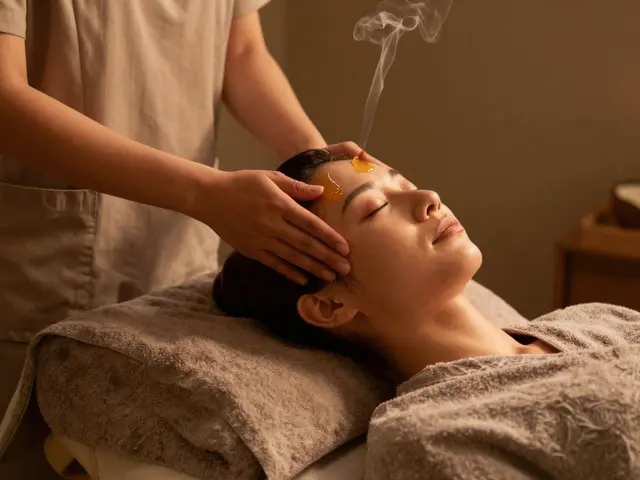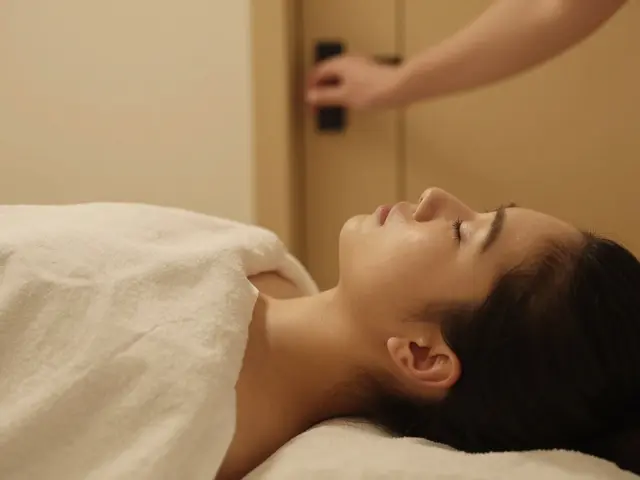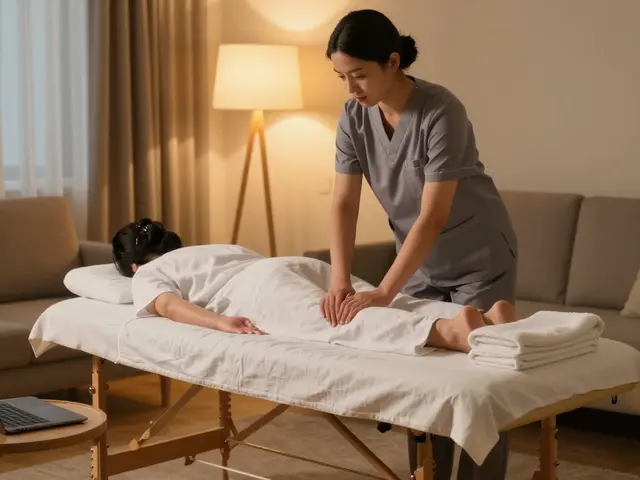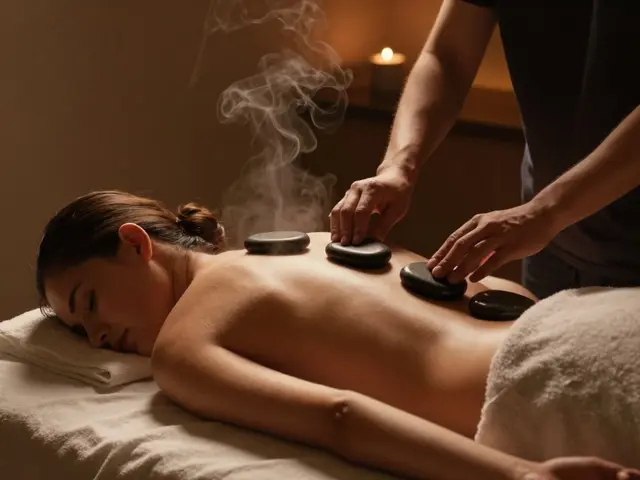Ever heard someone rave about how amazing an Indian head massage is, and found yourself sitting there with a big question mark—could it work for you, too? I get it. That scene where someone gets their scalp, shoulders, and neck loosened up sounds like the fix after a wild workweek or noisy kids. But before jumping onto the massage table, let's talk about what could actually stand in your way. Spoiler: Not everyone is ready for those magic hands. Keep reading—this stuff could save you time, money, and even a trip to the doctor.
Main Medical Conditions That Restrict Indian Head Massage
One of the first things any reputable therapist will ask: how’s your health? If you’ve got certain medical conditions, hitting pause on getting an Indian head massage could literally be a lifesaver. Let’s start with heart problems. If you’ve had recent heart surgery, severe hypertension, or history of cardiac arrest, the changes in blood flow from a massage, even if it’s just your head and shoulders, could actually be dangerous.
For folks on blood thinners, bruises show up like magic tricks you didn’t ask for. Because massage, especially over bony areas like your neck, can lead to mild trauma under the skin—which is no big deal for most, but not if your blood doesn’t clot easily. Got deep vein thrombosis, a recent blood clot, or a clotting disorder? Skip it. Massages can loosen clots, which nobody wants traveling elsewhere in your body.
Cancer or active tumors, especially in the upper body or lymphatic system, are a red flag. Even if you’re feeling okay, extra movement and increased circulation could spread malignant cells faster. Here’s another curveball: infectious diseases. Anything contagious, from something as common as lice to scalp ringworm or shingles, is an obvious hard no—not just for your sake, but for every client after you.
Don’t forget about fever, even if you’re just a bit under the weather. That soothing, relaxing massage? It increases core temperature and heart rate, putting your already struggling immune system under extra stress. Not to mention, sinus infections or severe migraines can get much worse after head manipulation. Ever had facial or scalp surgery? Wait at least six months, and always double-check with your doctor. Same goes for recent neck or spinal injuries—one wrong move could make things much worse.
Trouble with your skin? Eczema, psoriasis, or dermatitis, especially if it’s flared up, can turn a massage appointment into a painful and potentially infected mess. Moles, warts, or undiagnosed lumps should be checked by your GP before anything touches your skin. And if you’ve got any severe allergies, especially to essential oils or carrier creams, tell your therapist ahead of time, or you could end up with more swelling and redness than relaxation.
Temporary Conditions and Situations That Call for Caution
Even if you’re healthy most days, everyday stuff can catch you off guard. If you just had a car accident or sustained a whiplash injury, hold off until you’ve fully recovered and gotten the all-clear from your GP or physiotherapist. Got a fresh sunburn? Believe me, you do not want anyone touching your scalp, face, or neck. Massage could not only hurt but also cause peeling and even infections.
If you’re pregnant, there’s good news and bad news. Indian head massage can feel great for tension, but you need a therapist who’s qualified in prenatal massage. If you’re in your first trimester, many spas prefer to wait until after 12 weeks because of higher risks early on. Pregnant folks with high-risk complications (think pre-eclampsia or placenta problems) should always skip until they check with their doctor.
If you’ve just dyed your hair or had chemical treatments, the scalp is usually sensitive. Oils and friction can cause burning or itching—not exactly the chill experience you want. After major dental work or facial procedures, your head and neck might still be healing, so avoid pressure or pulling. Even piercings and tattoos need a break; wait until they’re fully healed before you go for any manipulation nearby.
And on a more relatable note: don’t book a session with a hangover. Your body is already struggling to rebalance fluids and deal with toxins. Massage could leave you feeling faint, dehydrated, or nauseous, especially with the room’s movement and oils’ scents. Not pretty.
If you’ve just had a vaccine or booster, give your body a week. Your immune system is adjusting, and massage may temporarily boost your lymphatic activity, which could worsen side effects.

Less Obvious Factors That Can Cause Restrictions
It’s not always the big stuff that gets in the way. Sometimes it’s subtle or something you never considered. If you’re dealing with extreme anxiety or trauma, and you’re triggered by touch—especially on the face or scalp—let your practitioner know. Indian head massage is supposed to be relaxing, not overwhelming.
Kids, especially younger than five, aren’t good candidates for standard Indian head massage, partly because they can’t communicate what feels okay and what’s too much. For teenagers, always check with a parent or guardian, and make sure the therapist is comfortable with younger clients.
For people with sensory processing disorders—autism, for example—even gentle head massage can feel intensely uncomfortable. The same goes for anyone with scalp injuries or hypersensitivity. Trichotillomania (hair-pulling disorder) is another unique case; massage can trigger compulsive behaviour, making the condition worse.
Don’t forget about the logistics: hair extensions, weaves, or hats that can’t be removed could make a standard Indian head massage impossible, or really awkward at best. Same with hearing aids or medical devices attached to the scalp—let your therapist know before your appointment.
Personal preferences matter more than you’d think. Some folks just hate the feel of oil in their hair or dislike strangers getting close to their face. If you’re in that camp, ask about dry massage options or skip the session altogether.
How to Prepare for an Indian Head Massage Safely
Ready to book? Here are a few things that can help you make the experience as safe and smooth as possible. Start with a pre-massage checklist. Make sure you’re not experiencing new symptoms or recovering from illness or injury. Clear it with your GP if you have a chronic medical condition, or if you’re taking medications that affect your blood clotting, immune system, or nervous system.
Be honest in your consultation. Share all relevant health information—even things that don’t seem connected, like a tooth infection or recent rash. Bring a list of allergies to oils, fragrances, or latex gloves. Ask your therapist what products they plan to use, and request patch testing if you’ve got sensitive skin.
Wear comfortable clothing, and avoid styling products or heavy gels in your hair that day; they can react badly with massage oils. Leave jewelry and hair accessories at home. Plan some downtime afterward and avoid heavy exercise, spicy foods, or alcohol for a few hours. Hydrate well—massage increases lymph flow, and you don’t want to feel dizzy or headachy from dehydration.
Here’s a quick cheat-sheet you can use for yourself before any appointment:
- Fever, infectious diseases, or suspected scalp infection? Wait until you’re better.
- Recent surgery or major injury in neck/head? Get medical clearance.
- Taking meds like blood thinners, steroids, or psych meds? Inform your therapist.
- Allergic to fragrances, nuts, or other ingredients? Request hypoallergenic products or bring your own.
- Pregnant? Check trimester and risk level. Only go to trained prenatal therapists.
- Kids? Make sure both child and therapist are comfortable.
- Sensory or mental health conditions? Talk it over before booking.
Data points researchers have gathered over the years highlight how crucial it is to be upfront with your provider. Take a look at this breakdown of key restriction categories reported in a 2023 survey of wellness practitioners in the UK:
| Restriction Type | Percentage of Clients Affected |
|---|---|
| Medical contraindications | 33% |
| Temporary health issues | 22% |
| Skin/scalp conditions | 18% |
| Lifestyle/personal preference | 15% |
| Age/sensory reasons | 12% |
If you’ve checked all the boxes and still feel unsure, ask your therapist for their advice. The right professionals love keeping everyone in their care safe—no question is too small, and there are always alternatives if you’re not quite massage-ready yet.
Long story short? Indian head massage is safe and soothing for most people, but not everyone. By knowing what might restrict you ahead of time and telling your *indian head massage* therapist everything they need, you can get your peace of mind along with your relaxation. Relax smart, not just hard.








